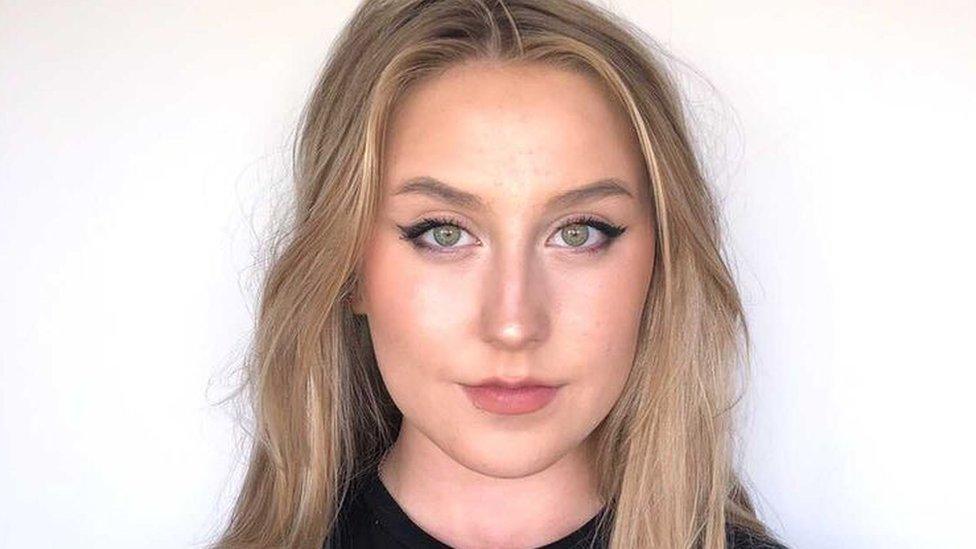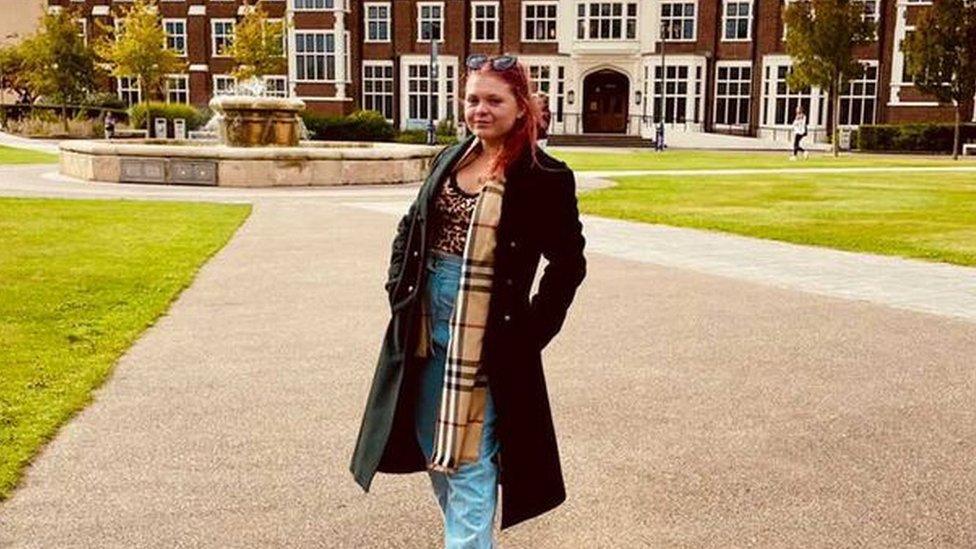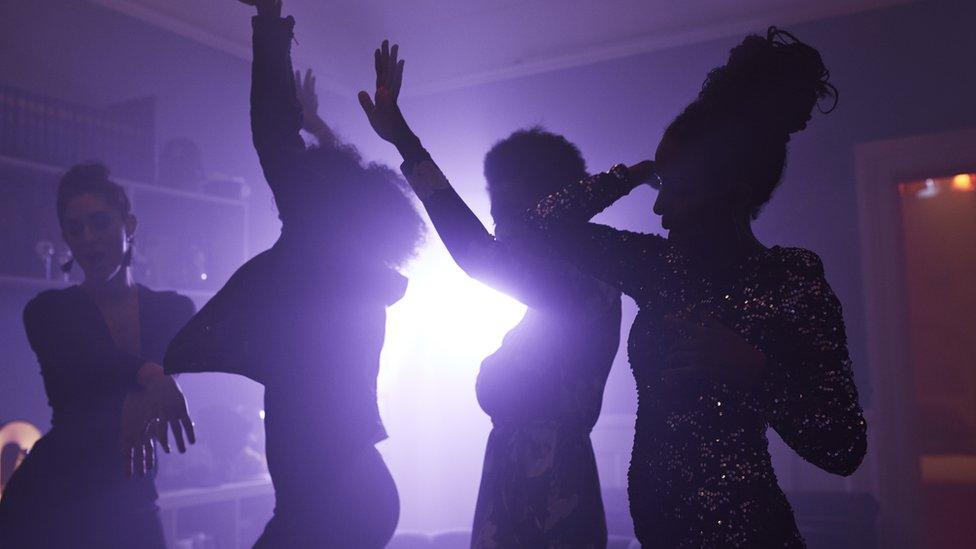Girls Night In: 'Spiking is part of going out - so we're staying in'
- Published
Three women explain how drink spiking has impacted them ahead of nationwide boycott
Women across the UK are boycotting nightclubs this week for a so-called "Girls Night In" to highlight the issue of drink spiking - and many say they know change is needed through personal experience.
Earlier this month, Mia Davson, a second-year student at Loughborough University, attended her first sports social event of the new term with her cheerleading squad.
The 20-year-old had decided not to drink a lot and was enjoying her night out when she suddenly felt unwell.
She turned to her friend for help before collapsing on him.
Mia is only able to piece together what happened next from her friends, but she knows she became unresponsive.
"I was out cold and completely unresponsive for about an hour and they said they were taking me to hospital," she tells BBC News. Mia believes she was spiked and has felt unsafe going out since.
Mia is now one of hundreds of women across the UK preparing to boycott nightclubs on Wednesday night in a bid to raise awareness about spiking and sexual harassment at venues.
The Girls Night In movement has established support in almost 50 locations including London, Edinburgh, Bath, Liverpool, Bristol, Falmouth, Hull, St Andrews and Swansea.
The campaign, which has drawn some criticism for suggesting women should stay at home rather than go out, is calling for more preventative measures.
Across September and October, there have been 198 confirmed reports of drink spiking and 24 reports of spiking by injection, the National Police Chiefs' Council said.
The incidents took place at both licensed premises and private parties and included male and female victims.
'Boiling point'
Helen Lavery, 19, felt motivated to join Mia organising the Loughborough Girls Night In campaign after noticing how many of her peers felt unsafe on nights out in recent weeks.
"On a night out you could see all the girls holding their arms," she says, in response to reports about spiking with needles.
In Leeds, 20-year-old university students Joscelin Story and Isabel Davies also started a Girls Night In account - the movement is not centralised but there is a WhatsApp group for members.
Joscelin and Isabel helped create an Instagram page for the city on 18 October and already have 4,000 followers, which Joscelin says is testament to the "boiling point" that women have reached.

Helen Lavery is supporting Girls Night In
"For too long spiking has been an ingrained part of university and going out culture and for too long the issue of women's safety has been a women's problem," she says.
"We're trying to shift the narrative from victim blaming to perpetrator shaming."
The organisers understand the criticism from some that encouraging women to stay at home seems like a contradiction.
But they say the financial impact on venues - many of which have been closed for long periods during the pandemic - is what is required to generate action.
"Sadly a lot of businesses aren't going to take it seriously and introduce policy change until they see a loss in revenue," says Joscelin.
Anna, 20, a third-year politics student at the University of Bristol says there are short and long-term aims of the group.
"We're not here to villainize the nightlife industry, if anything we want to work with them so people continue to go out."
Instant testing
Isabel says that they want clubs to establish a greater duty of care for customers and offer safe spaces, rather than ejecting those who become unwell from venues on to the street.
Anna wants nightclubs to have welfare training for staff, including agency workers, and bouncers, as well as an identifiable welfare officer.
One Parliament petition, unconnected to Girls Night In, is calling on the government to fund free drink spiking test kits that give an instant result has reached 12,000 signatures.
Another petition, with over 170,000 signatures, says it should be a legal requirement for nightclub guests to be thoroughly searched on entry.
But some members of the Girls Night In campaign fear encouraging a heavier security presence or more CCTV could affect marginalised groups.
Anna, from Bristol, said efforts have been made to make it "as inclusive as possible" while the Edinburgh group said "all genders and people of all identities" are welcome to join.

Women across the country, including Petra from Loughborough, say a "boiling point" has been reached over violence against them
Spiking is a criminal offence carrying a maximum 10-year prison sentence but most of the women who spoke to the BBC said they did not report it to police.
For those who said they did report it, no further action was taken.
Michael Kill, CEO of the Night Time Industries Association, says the organisation is "very concerned" about the reported increase in spiking incidents.
"We have publicly called for an inquiry by the Home Office into this issue, so we can gain some clarity on the scope and gravity of the situation."
He pointed towards "staff training, searching protocol, incident procedures and welfare/medical provision".

(From left to right) Isabel Davies, Izzy Broadhurst and Joscelin Story
Mr Kill encouraged anyone who believes they have been spiked to approach staff or management at a venue.
Drinkaware, an alcohol education charity, says that if an attacker spikes your drink it is unlikely to look, smell or taste any different.
But the physical symptoms of being spiked can include loss of balance, feeling sleepy, visual problems, confusion, nausea, vomiting, or unconsciousness.
It is expected more than 30 different cities will be included in the boycott on Wednesday night - others took place on 25 and 26 October as part of a staggered response.
Mia says she knows change "isn't going to happen overnight" but that it is just the start.
"After the boycott we have no intention of just ending this," Joscelin says.
"What do we as a country have to say for ourselves if we're letting perpetrators of sexual violence get away with nothing more than a slap on the wrist? There needs to be a nationwide discussion."
Related topics
- Published21 October 2021

- Published22 October 2021

- Published15 October 2021

- Published7 January 2020
